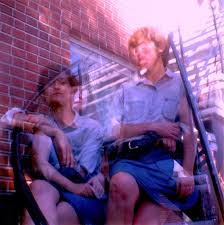It would be very reductive to call Too Significant To Ignore, an electronic spoken word album, though, de facto, this description would be true and fitting. From the very beginning, it’s obvious that the record stands on the thin line between music and contemporary art. And it is no wonder, knowing that Andrea-Jane Cornell, besides a radio professional, is a recognised sound artist and Tim Darcy, before Ought, has a past life as a poet in his trunk. Their collaboration dates back to a few years ago – an early version of the album’s opening ‘No More Bacteria’ from 2013 can be quite easily found online – but since those first demos the synergy between the two of them seems to have reached its peak: listening to Too Significant To Ignore it’s hard to tell if Cornell’s drones are a background to Darcy’s words, or if the poetry recital was meant to be a completion to the soundscape.
The vocalist’s declamation is emphatic and dramatic to the extreme, reminding at times of a Velvet Underground’s era Lou Reed, at times to an old recording of Beat Poetry improvisation: Allen Ginsberg’s Howl is, in fact, a presence that hovers all through the album, to come out openly in episodes like the title track, or ‘Cosmetic Sadness’, with their long verses and social themes. Assonances and alliterations give musicality and rhythm to Darcy’s words, making them sometimes melt completely within the sonic background, in sudden burst or feedbacks that pierce the listener’s ear as well as his mind.
Cornell’s use of mixed analog and digital sounds – synthesisers, field recordings and real, processed instruments tracing wide strokes of muffled, dilated, amniotic drones – defies gravity, allowing all that’s taken within its whirl to float in space and lose contact from reality, in complete antithesis to the poet’s topics and narratives, thus generating a space-age nightmare of sort.
The whole album feels like a trip inside the mind of a paranoid preacher, outing his anxieties over the sound of gravitational waves. An experience that goes beyond psychedelia, as it is extremely real: in Darcy’s style, there is nothing positively spiritual or dreamy in the lysergic delirium of his words, rather a dive into society’s darkest sides. Miscommunication, individualism, technology taking over human interactions, panic: "I’m back at the café, looking around, and everyone in here is on their laptops, the man next to me, ‘give me those headphones, I want to hear God!’" hollers Darcy on ‘This Cafe (Is Not Anonymous Enough)’.
‘There Is A Door’ claims the last poem’s title, before leaving space to the loose computerised accordion of ‘Phosphene’. And if, as it seems, it’s that of perception the portal they are referring to, what’s behind might not be as good as we’ve always thought it would be.


